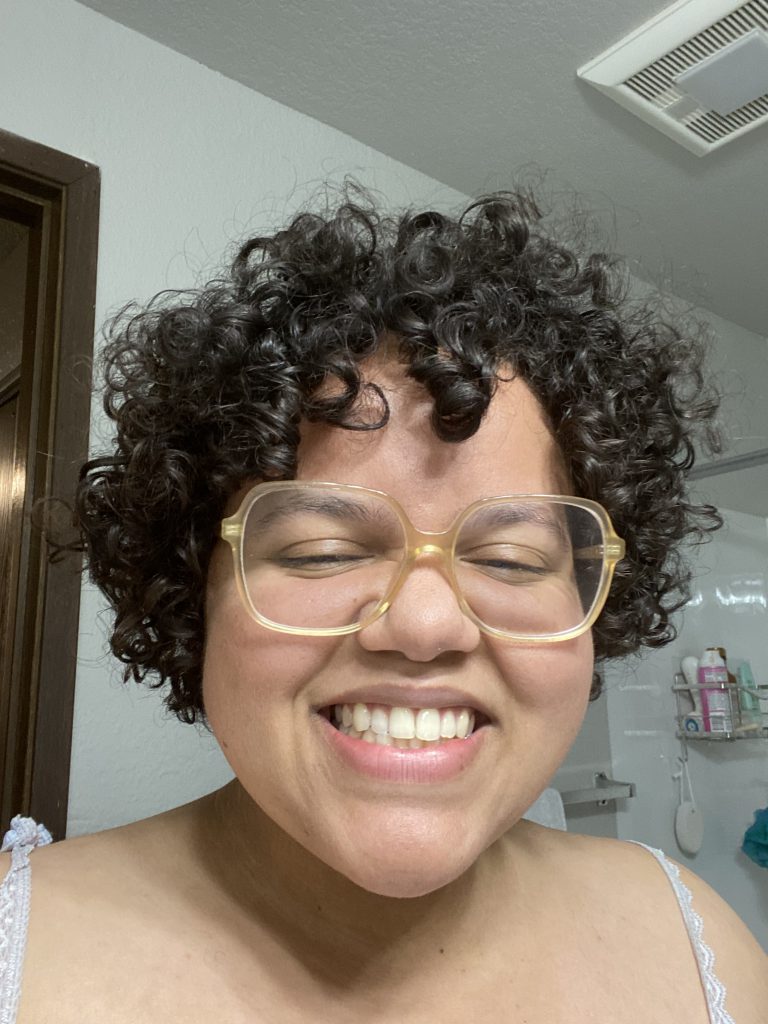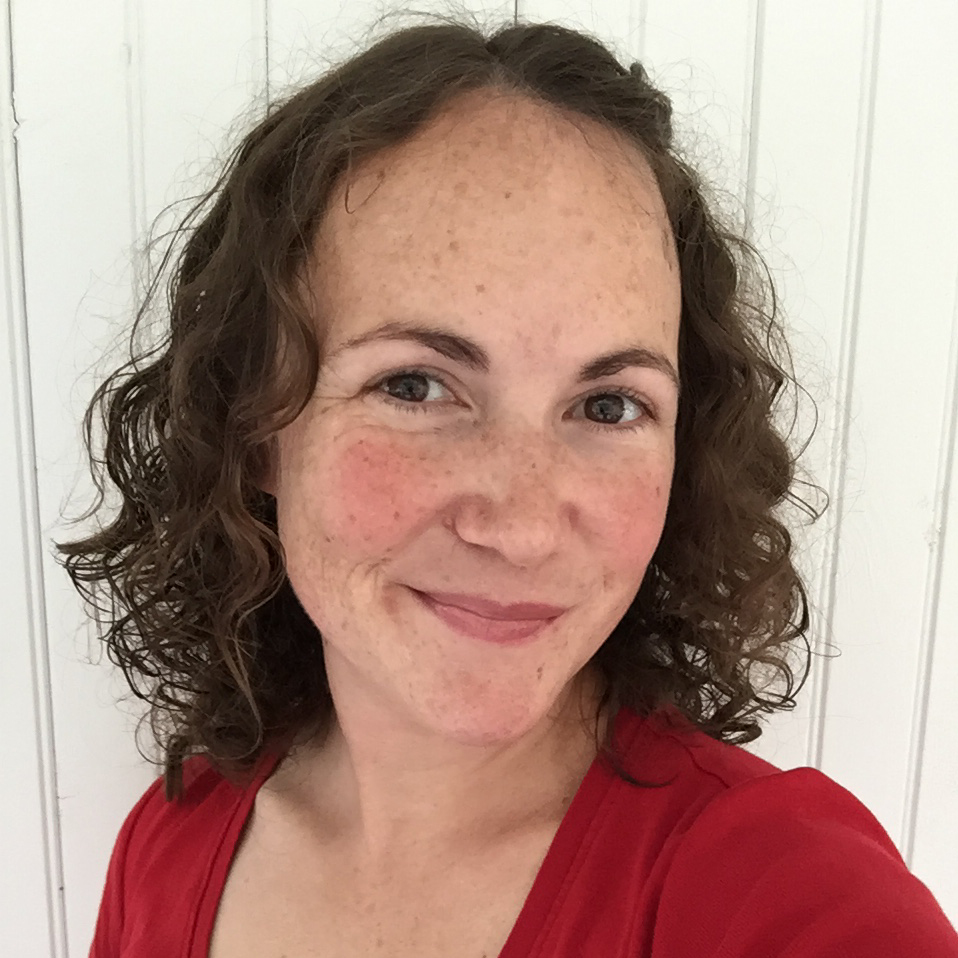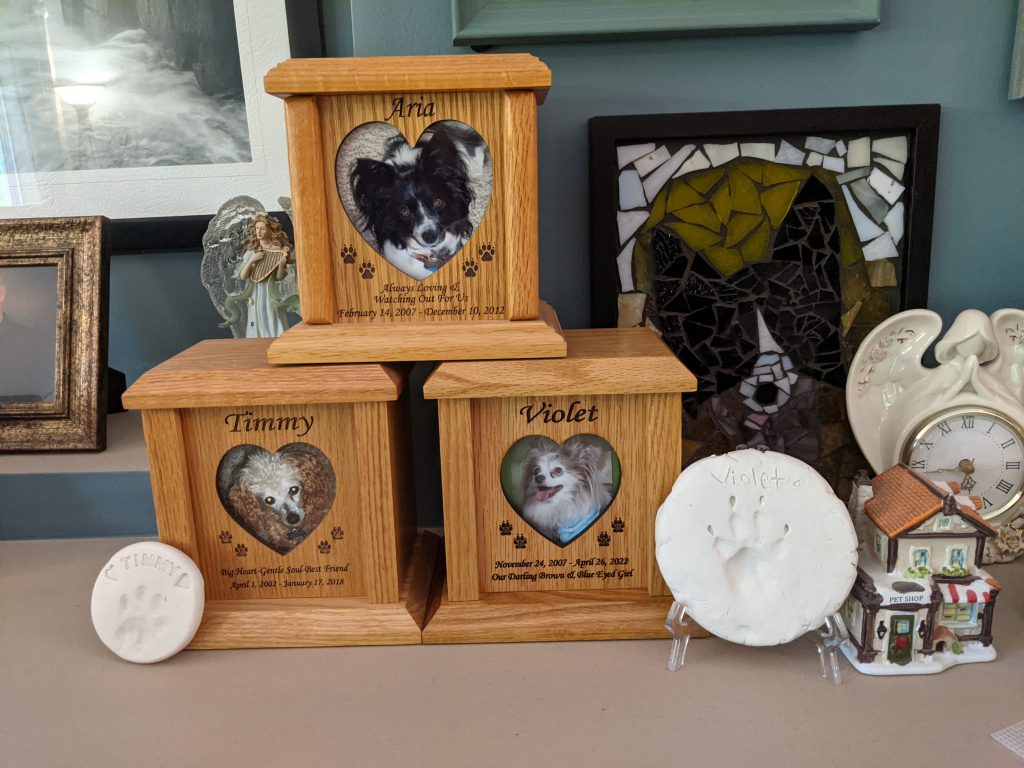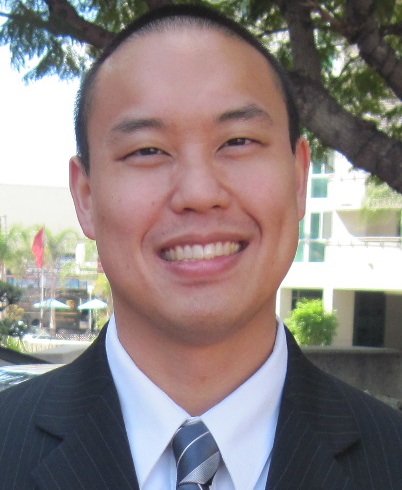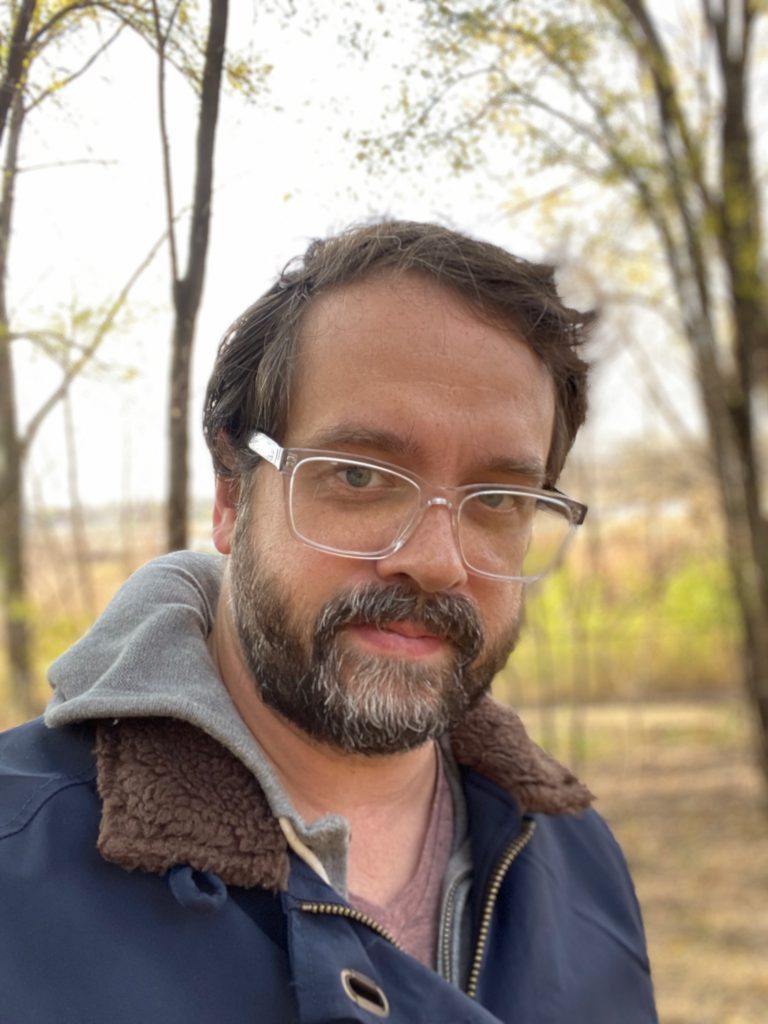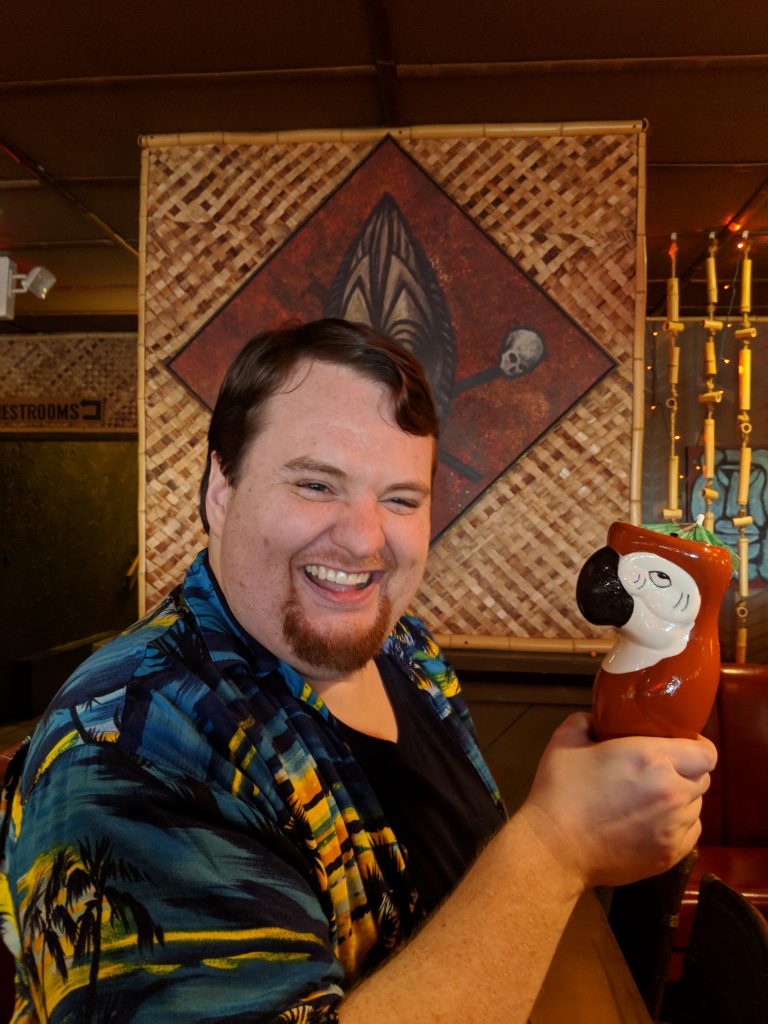edited by David Steffen
Content note (click for details)
Addiction, suicidal ideation, body horrorThe octopus comes into Shun’s bedroom on a brisk winter morning. It squeezes through the open window and onto her desk, where Shun is filling out an application for a job she doesn’t want just so her day doesn’t feel entirely wasted.
Shun stares at the octopus, and the octopus stares back. It has tentacles as thick as her wrists, which coil and uncoil in constant motion. Plum-dark skin, wet and molten and pulsing. A glinting yellow eye, rectangular-pupiled, watches her in the soft light.
She’s not sure how the octopus got here. Her apartment complex is miles away from the ocean, and even further from the aquarium. But it feels rude to ask where it came from.
What are you doing here? she says instead.
I want to borrow your body, says the octopus.
Why?
To find out what it’s like to be a person.
But it’s my body, says Shun. I’m using it.
So? says the octopus. What are you using it for that’s so important, anyway?
It’s true that Shun has no plans for the rest of the afternoon. It’s been four months since she was laid off from her corporate job, and her last Hinge date ended alone in her bedroom with her vibrator. She doesn’t even have close friends in the area, just acquaintances she occasionally meets for dinner or drinks. No one will miss her if she lends her body to an octopus for a few hours.
And the octopus seems so hopeful, so expectant. Like she could make all its dreams come true, just by acquiescing to this one thing.
Why me? says Shun.
Because look at you. You’re perfect.
Shun hasn’t heard anyone say that to her in a long time. Blushing, she says, how does this work, exactly?
It’s easy, says the octopus. Just say ahh and let me in.
Shun opens her mouth. Headfirst, membrane-slick, the octopus injects itself between her teeth and burrows down her throat.
***
Shun wakes up in a fetal position under her desk, her cheek pressed against the cold floorboards. The octopus is nowhere to be seen.
The window is still open, the world outside wet-whisked and gray. Her skin goosebumps in protest. There’s no central heating in her two-bedroom apartment, and she and her roommate Olivia have to take turns using their space heaters so they don’t burn out the power. She must have missed her turn to have the space heater on.
She checks her phone. It’s 4 p.m. The octopus must have occupied her body for almost five hours. She doesn’t remember those five hours, but they left her with a pleasant aftertaste: like she had no control, and by extension no responsibilities.
There’s a spate of notifications on her lockscreen. She has a form rejection letter from a job she applied to last week: Thank you for considering us, but we’ve selected other candidates to move forward with. Four new matches on Hinge, a girl and three guys, people reduced to profiles; she doesn’t even remember swiping right on them. Two missed calls from her mother, who still lives in the sunny California suburb where Shun grew up.
She calls her mother back.
Did you see the pictures I sent you on WeChat? says her mother.
What pictures?
Your cousin Matthew just got a promotion. He’s a manager now, so exciting. To celebrate, he took us all out to that new Beijing restaurant I told you about last week.
That’s great, Mom.
The restaurant was disappointing, her mother goes on. I don’t know where the owners were from, but I bet they weren’t even real Beijingers. The youtiao didn’t taste didao at all. But that’s not Matthew’s fault.
Shun makes the appropriate noises of sympathy and appreciation. She’s only half paying attention. Mostly she’s thinking about the octopus, about how easily she was able to satisfy its request.
Anyway, says her mother, have you gotten any job interviews yet?
I’m trying.
Trying, trying, says her mother. You’ve been trying for so long. Why did we spend so much on your college tuition, if you can’t even get a job with it? Maybe you can ask Matthew for a referral.
Matthew’s a software engineer, Mom. I’m a graphic designer.
So what? You can learn how to do his job. You’re smart.
Shun zones out and thinks about the octopus again.
Her purpose in life used to feel so clear. She was her parents’ only child, and she always knew they were proud of her. Success was measurable. Report cards and gold stars and gymnastics trophies. How devastating it had been, to grow up and find herself lost; to realize that all those things she’d devoted so much effort to had nothing to do with real life at all.
With the octopus inside her, things felt simple again. When she closes her eyes, she can still taste it, that milk-drunk reverie of knowing she had only one purpose to serve and that she could do it well.
***
Shun leaves her bedroom window cracked open a few inches, despite the chilly weather, in case the octopus wants to come back. To compensate, she wears extra sweaters during the day and long underwear at night.
A few days later, she finds the octopus perched on her desk again.
I didn’t know if you were coming back, she says.
Are you happy I did? says the octopus.
Very much so.
Of course I came back, says the octopus. It was wonderful to be you.
Nobody has said that to Shun before. She feels strangely proud, like she’s accomplished something, even though all she really did was agree to let the octopus in.
What did you do while you were me? says Shun.
A little bit of everything, says the octopus. Can I borrow your body again this evening?
Sure, says Shun.
This time, can you cook something for me? Something delicious? I didn’t get to try any people food last time.
Shun’s surprised that the octopus is bold enough to ask her for more, when she’s already giving it so much. But then again, why wouldn’t she? It’s not like she has other plans, really. Just job applications and video games and maybe a walk to the nearest restaurant, plans so pathetic they hardly constitute plans at all.
She looks up what octopuses eat. Snails, sea slugs, shrimp. Mussels, crabs, clams. A vast array of fish.
She decides to make hong shao yu for the octopus, a recipe her mother only prepares for special occasions, like Chinese New Year or large family reunions. Surely the octopus’s first human meal counts as a special occasion.
She makes the half-hour trek to the closest Asian grocery store and buys two pounds of tilapia, ginger, scallions, soy sauce, cooking wine, a whole jar of chili oil. In the hot steam of the kitchen, she spoons sizzling liquid over the fish, one ladleful at a time, until it’s so tender that the flesh unclasps off the bone.
***
This time, she wakes up at the gym, draped over one of the benches in the back, in an undignified kneeling position. A man next to her lets out alarmingly loud grunts every time he finishes a deadlift. People scroll on their phones at the cable machines, waiting between sets. A couple in matching gray hoodies run on the treadmills together, their feet slapping the moving tape in syncopated rhythm. Nobody pays any attention to her.
Shun sits up and looks at herself. The octopus dressed her in an ordinary gym outfit: sweatpants and a t-shirt. But she’s not wearing sneakers, just her winter boots, which she never usually wears to the gym.
She stretches and feels the ache in her shoulders, her calves, her back. Whatever workout the octopus did, it was a surprisingly punishing one.
When she gets home, Olivia is sitting on the couch, eating a salad and watching a rerun of an old sitcom on the TV. She looks annoyed when Shun joins her. I did your dishes, she says curtly.
Oh, says Shun. You didn’t have to do that.
I literally did have to, actually. The kitchen was unusable. When you cooked yesterday, you used so many dishes and left such a mess.
Shun had meant to clean up, but she hadn’t gotten a chance before the octopus came back. Sorry, she says. Were there any leftovers?
Don’t you remember?
Shun shrugs.
Olivia furrows her brow. I didn’t see any leftovers. You ate it all.
Shun nods. She hopes that means the octopus liked the hong shao yu. If it ate the whole two pounds, she must have done a good job.
You’re so weird, says Olivia. Also, don’t forget rent’s due tomorrow.
Shun thinks sometimes that she and Olivia could be friends, if they didn’t live together. All of her friends live far away, in cities like New York and San Francisco. Maybe it’s easier this way, when she can lend her body to the octopus without having to make up excuses for anybody.
***
When the octopus returns, it doesn’t even mention eating the hong shao yu, except by asking Shun to cook more food next time.
Shun figures it’s a good sign that the octopus is asking for more. As long as it enjoys Shun’s cooking, it’ll keep coming back. It won’t get bored of her.
But the octopus still doesn’t seem fully satisfied. It sits on her windowsill and looks her up and down.
You have all these weird hairs, the octopus says, pressing a tentacle against her arm. Will you make them go away for me?
Everyone has hair on their arms, says Shun.
I don’t like them. My tentacles have no hairs.
Okay, says Shun. I’ll get rid of mine for you.
In the shower, she shaves her arms smooth. Her cheap razor trudges slowly over her forearms, unable to catch everything. Blood beads in the places she nicks herself by accident. Afterward, she takes a tweezer under the bright light of her desk lamp and plucks the hairs the razor missed, one tiny strand at a time, wincing as each one leaves her skin.
***
Shun starts anticipating the octopus’s needs before it arrives. It’s gotten more demanding over time, but she’s gotten better at figuring out what it wants from her, better at keeping it happy.
She dips into her dwindling savings to buy new brand-name sneakers, so the octopus can go back to the gym again.
She goes back to the Asian grocery store and fills up her cart with fresh ingredients so the octopus can sample all her favorite dishes: beef noodle soup, scallion pancakes, pig ear.
She buys exfoliating cleanser and scrubs her entire body, especially her arms, to make sure her skin stays soft and smooth.
The octopus uses her for ten hours next time. And then sixteen. And then a full day. Blank stretches populate Shun’s calendar, selfhood discontinued and resumed. Each time she wakes up, Shun’s rewarded with the sugar-sheened feeling of having done the one thing she’s meant to do.
***
You forgot to take out the trash again, Olivia says. You were home all day, it wouldn’t have been hard.
I just forgot, says Shun. It’s not a big deal.
I’m too tired to do your chores for you, says Olivia. You remember what corporate life is like. My boss put three unnecessary last-minute meetings on my calendar today. It’s like, hello, couldn’t we have accomplished all of this over email?
Shun doesn’t feel particularly sympathetic to Olivia’s corporate struggles right now. She doesn’t like being reminded that even if she succeeds at her endless job search, the light at the end of the tunnel is just Olivia’s brand of misery instead of her own.
Olivia scoops leftover pad thai out of the takeout tub in her lap. She says, are you seeing someone?
Kind of, Shun says.
You must really like them. You’re barely ever around anymore.
I guess I do, says Shun.
But when she really thinks about it, it’s not that she likes the octopus, exactly, or its presence in her life. It’s just that she knows how to make the octopus happy.
She can’t explain that to Olivia, or even to her mother. Her mother left her several missed calls yesterday, while Shun’s body was being occupied by the octopus, but the thought of talking to her mother again feels exhausting, especially since Shun hasn’t submitted any new job applications in weeks. It won’t help to mention that the last company she interviewed with decided not to hire a designer at all, opting instead to generate their graphics with a free AI program.
Instead of calling her mother back, Shun sits on the couch and scrolls through TikTok, which she always does when she needs to relax. A video about child refugees makes her cry, and when it’s over she scrolls on, and a minute later while watching a funny video about a hamster eating a burrito she notices there are tears on her cheeks but she’s already forgotten why.
***
Shun wakes up on the beach, lying faceup on a pile of driftwood. In her mouth, the taste of salt.
She has no idea how she got here. Maybe the octopus found itself homesick while it was wearing her body.
Waves slurp at the shore just a few feet away from her, spraying white mist into the air. It’s an unusually warm day, so the beach is full of families. Children wade in the surf, making suction holes in the sand with their bare feet. Gulls wing overhead.
It’s the type of seascape that makes her fingers itch for a paintbrush. She used to love painting seascapes. She majored in graphic design because it seemed like the most financially sustainable way to pursue her love of art, but after she got her first job she never had time to create for herself anymore, and over the years that impulse atrophied away.
Shun sits up and inspects herself. She’s barefoot, wearing a sweater and jeans. It feels like someone is pounding a battering ram into her skull, just above the right temple. Sunburns cover her neck and shoulders, painful to touch; bruises mottle her left shin.
She has no phone, no wallet. Just a ten-dollar bill she finds crumpled inside her back pocket.
Her stomach mutinies with hunger. The octopus must not have eaten anything in a while. On the closest street, she uses her ten-dollar bill to purchase a family-sized basket of fish and chips and starts shoveling it into her mouth as soon as it’s served.
What day is it today? she asks the vendor.
The vendor looks alarmed, maybe by the fact that she needed to ask that question, or maybe by how fast she’s gorging herself. It’s Saturday.
Shun thinks back. It was a Wednesday, wasn’t it, the last time she let the octopus borrow her body? Or was it a Tuesday? She doesn’t remember. Has she really been possessed by the octopus for three or four days?
She could have drowned. She could have starved. She could have never even woken up at all. Part of her would have been willing to pay that price, but it’s not the part she wants to let win.
She takes the bus back to her apartment and walks inside, ignoring Olivia’s angry queries about where she’s been. She goes to her bedroom, where she steps over the piles of dirty clothes the octopus has left strewn all over the floor. On the top shelf of her overcrowded closet, she finds a box of her old painting supplies. She lays them out on her desk: soft-bristled brushes, a pad of paper, a few thin-squeezed tubes of raw sienna and prussian blue. For the first time in weeks, she closes her window and latches it shut.
***
Shun wakes to the sound of tapping. A soft tentacle against hard glass.
She feels nauseous. Her stomach roils as she sits up. Maybe it’s all the fish and chips she gorged herself on.
The octopus is waiting outside the window, sprawled out to its full length, clinging to the glass.
Shun unlatches the window and pulls it up a crack, just enough to be able to look the octopus in the eye.
What do you want? she says.
You know what I want, says the octopus. I’ve only ever wanted one thing.
It’s my body, says Shun. You don’t get to keep it.
Why not? You don’t like being a person anyway, and I do.
Shun doesn’t protest. She’s afraid that if she does, she’ll be able to hear the lie in her own voice.
The octopus stretches forward. It squeezes itself beak-slim, the way it does each time it enters Shun’s mouth, and in a swift glistening motion, begins prodding at the opening.
Shun slams the window shut. The octopus recoils.
You can’t shut me out, the octopus tells her through the glass. We’re the same, you and me.
Shun opens her mouth to respond, but before she can, her stomach gurgles again. Something churns inside her, a liquid sloshing.
She stumbles to the bathroom. She doesn’t know what it is, she just knows she needs to get it out, out.
She bends over the toilet, gripping its porcelain hips. The ends of her hair pool in the toilet water; she doesn’t have time to tie it back. She heaves, shoulders rising, back arched.
Wound-dark liquid gushes out of her mouth and splatters into the toilet bowl. It looks like blood. But the smell is wrong: less like iron, more like seaweed and sulfur and salt.
The realization cuts into her.
Not blood. Ink.
She looks into the mirror. Octopus ink stains her chin. There are purple bags under her eyes, thin hollows under her cheekbones. Her dark hair frames her face in unwashed clumps.
She leans back over the toilet bowl again, throat gouging, saliva glistening. As the ink leaves her body, she feels a new sort of clenching, an emptying.
Shun wipes her mouth with the back of her hand and flushes the toilet clean. She watches the blackened water swirl down, down, back toward the sea.
© 2025 by Hannah Yang
3035 words
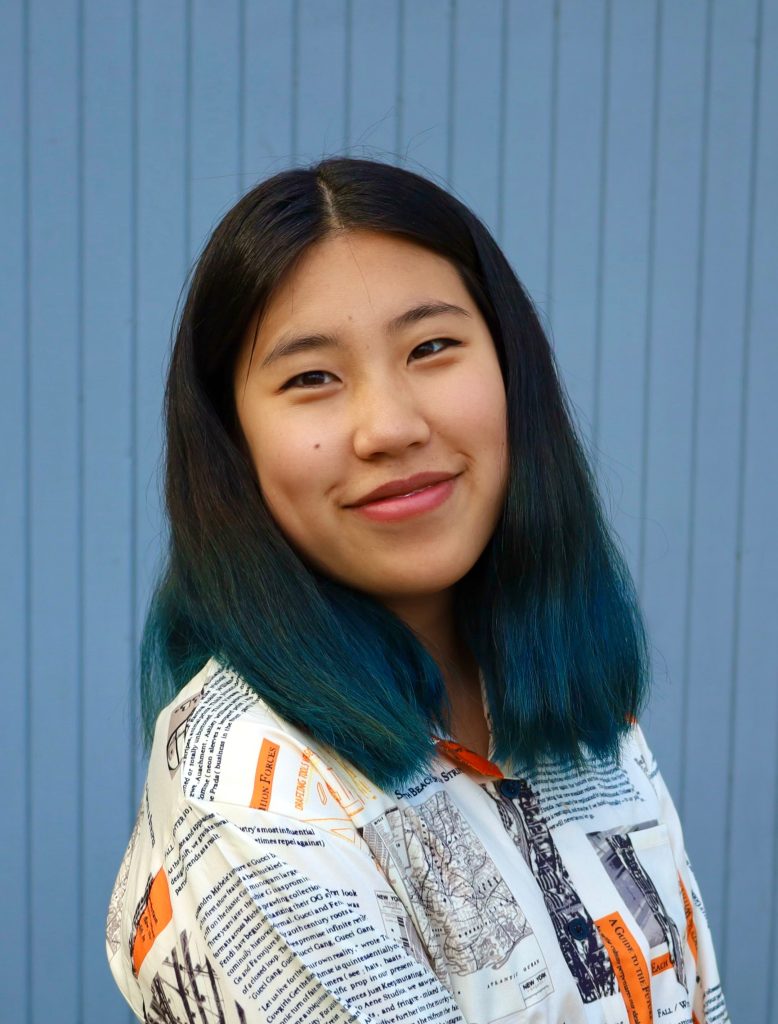
Hannah Yang is a speculative fiction author who writes about monsters, metamorphosis, and feminine rage. Her stories have been published in Apex, Analog, Clarkesworld, Fantasy, and multiple Year’s Best anthologies. She has a BA in Economics from Yale and works in philanthropy research. Follow her work at hannahyang.com or on Instagram at @hannahyangwrites.
If you enjoyed the story you might also want to visit our Support Page, or read the other story offerings.


